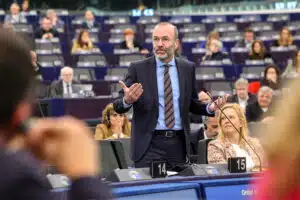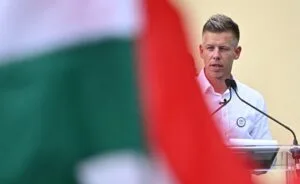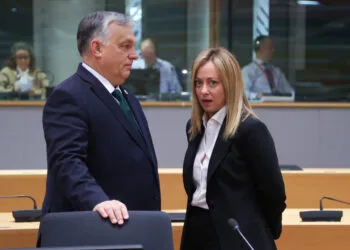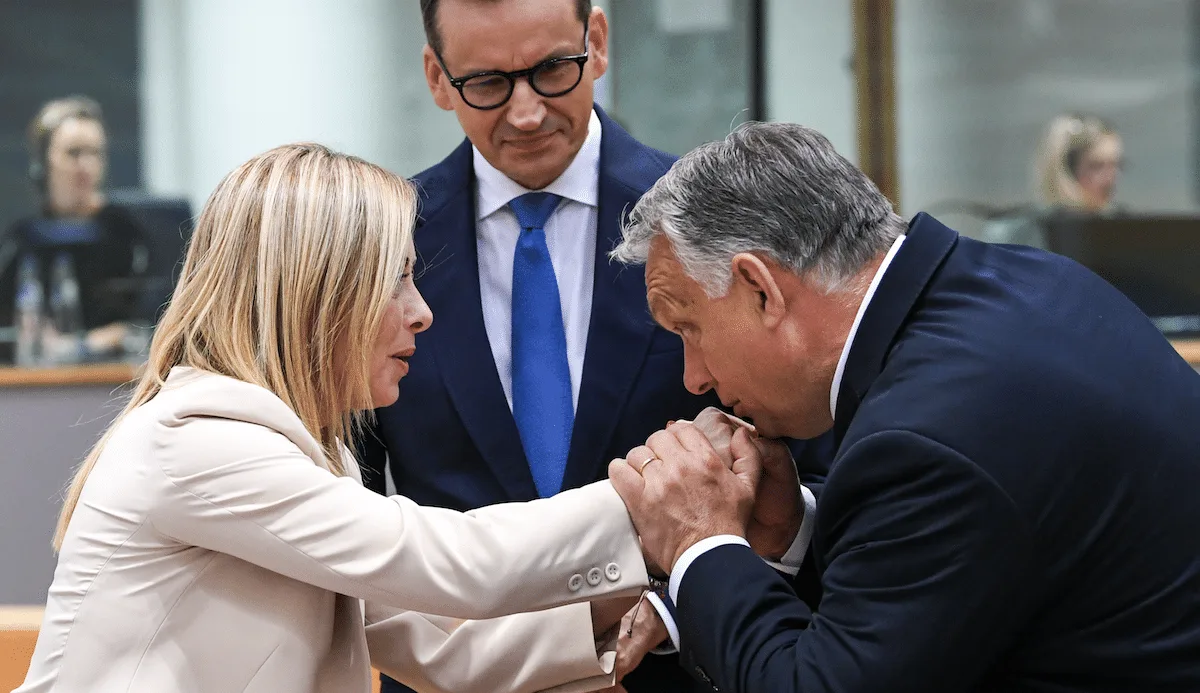Brussels – The polls in Hungary are not yet open, but political scenarios within the groups in the new European Parliament are already beginning to loom on the horizon. While Hungary’s prime minister, Viktor Orbán, is busy weaving political plots to join the European Conservatives and Reformists Party (ECR) of Italy’s Prime Minister, Giorgia Meloni, pushing at the same time for a (very difficult) mega-group with the far-right parties of Identity and Democracy, the European People’s Party (EPP) would be in contact with the main opposition party to Orbán in these European elections (and municipal as well) to welcome him within its parliamentary group, fostering the rise of a moderate, liberal centre-right opposition in Budapest along the lines of what happened in Poland in the fall of 2023.

According to Politico, the chairman of the EPP, Manfred Weber, confirmed a willingness to work together in the European Parliament with Péter Magyar, former leader of the ruling Fidesz party and a leading politician of the centrist Tisza (Respect and Freedom) party. “Our doors are open,” the German politician said, stressing that he would be “pleased” to offer a European home to Orbán’s most credible challenger. Several Hungarian media outlets confirm Politico’s rumours and point out that for Magyar, European political affiliation is crucial not only for obtaining prominent positions in Brussels but also for establishing itself as a nationally structured political force. For this reason, Tisza is expected to submit a formal application for membership in the EPP group just after the European elections (scheduled in Hungary on June 9).
Sources in the EPP told the Hungarian daily Népszava that Weber and Magyar conversed on the phone this morning (June 7) and agreed that, after the membership application, the decision will be made by the new members of the parliamentary group at the June 18-19 meeting. According to the latest polls, in the June 6-9 elections, the European People’s Party is expected to emerge as the leading political force with 173 MEPs, while the 5–6 Hungarians from Tisza (polled at 25 per cent) are expected to find a place in the hemicycle. It should be remembered, however, that what is under discussion at the moment is the Magyar party’s membership in the EPP parliamentary group, and not in the European party, since there are two separate ways of entry (with different rules) and a possible obstacle to the second way.

Those who apply for membership in the parliamentary group must obtain a majority of the group’s existing members in the European Parliament. On this point, no particular difficulties lie ahead for the new Hungarian party. However, membership in the political family will be more complex—but not impossible—given the veto power of the individual member parties of the European party itself. In fact, after Orbán’s angry farewell in 2021—just before suffering the indignity of the expulsion—the EPP still had Hungarian members: the right-wing conservatives of the Christian Democratic People’s Party (KDNP) remained in place among the ranks of the European People’s Party, but they did not abandon their alliance with Fidesz. In the course of the EU Parliament’s winding down legislature, Orbán’s satellite party also expressed one MEP, György Hölvényi, who is currently at the bottom of the joint list between Fidesz and Kdnp. While the Christian People’s Party could—in principle—veto Tisza’s membership in the EPP, it is equally true that his blackmail power within the European People’s Party family is somewhat limited, and expulsion for continued collaboration with Orbán is not unlikely.
Who is Magyar, Orbán’s challenger in Hungary
A 43-year-old lawyer, Magyar burst onto the political scene in 2010—after Fidesz’s victory in the 2010 elections—with his appointment as an official in the Ministry of Foreign Affairs and then in Hungary’s permanent representation to the European Union coinciding with Hungary’s rotating presidency of the EU Council in the first half of 2011. In 2015, the Prime Minister’s Office hired him, and three years later, he was appointed to the board of the state-owned MFB (Hungarian Development Bank). Despite his long career as a member of the Fidesz leadership, in all these years, Magyar remained virtually unknown, or at most remembered as the husband (former since 2023) of (resigned) Justice Minister Judit Varga.

The political limelight began for Magyar in mid-February of this year, corresponding to a scandal that engulfed the ex-wife Minister of Justice and the then President of the Republic, Katalin Novàk. All stemmed from the pardon granted last year to the deputy director of a state orphanage, who had been imprisoned for covering up a series of sexual abuses of minors in the facility: the news only became public knowledge earlier this year, sparking widespread outrage and enormous street protests (lacking political leadership). That’s how public pressure forced the resignation of both direct supervisors—close allies of Orbán—before the election of the new President of the Republic, Tamas Sulyok. Very quickly, Magyar publicly announced her resignation from the boards of directors of two state-owned companies (and resignation from office in a third) in addition to her farewell to Fidesz, declaring an all-out fight against the Orbán government.
With the publication of some recordings dating back to 2023 of then-Minister Varga—showing that some prominent members of Orbán’s cabinet had evidence removed from court files to make their involvement in corruption cases disappear—the new opposition political figure has begun to set the campaign early on the anti-corruption agenda, also showing excellent oratorical skills and a strategic vision on the ground inherited from years of militancy in Fidesz. Last March 15, Magyar held a rally in Budapest to announce the formation of a new party, which did not happen due to the already overdue deadline for registration for the European elections in June (three days earlier). Thus, in mid-April, the politician announced his entry into Tisza, assuming its vice presidency and acknowledging its closeness to centrist and anti-corruption political views. In the course of campaigning for the European elections, Magyar has demonstrated excellent oratory skills and his ability to get a grip even in rural areas, including traditional Fidesz strongholds such as the city of Debrecen (where he will try to take away the mayoralty from Orbán’s party on Sunday).
English version by the Translation Service of Withub







![[foto: archivio]](https://www.eunews.it/wp-content/uploads/2018/02/inflazione.jpg.webp)


